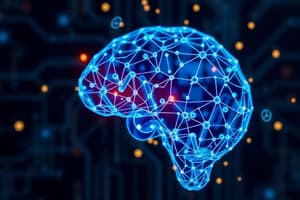Podcast
Questions and Answers
What is the first step towards finding a solution to a problem?
What is the first step towards finding a solution to a problem?
- Decomposition
- Defining the Problem (correct)
- Inductive Reasoning
- Deductive Reasoning
Which method involves breaking down a complex problem into smaller, more manageable parts?
Which method involves breaking down a complex problem into smaller, more manageable parts?
- Problem Generalization
- Deductive Reasoning
- Inductive Reasoning
- Decomposition (correct)
When faced with a well-defined problem in mathematics, which type of reasoning is particularly useful?
When faced with a well-defined problem in mathematics, which type of reasoning is particularly useful?
- Defining the Problem
- Deductive Reasoning (correct)
- Problem Generalization
- Inductive Reasoning
Which method involves starting with specific observations to build general principles or theories?
Which method involves starting with specific observations to build general principles or theories?
What does the process of decomposition aim to achieve in problem-solving?
What does the process of decomposition aim to achieve in problem-solving?
Why is defining the problem important in the problem-solving process?
Why is defining the problem important in the problem-solving process?
What distinguishes algorithms from heuristics?
What distinguishes algorithms from heuristics?
When is brainstorming particularly useful in problem-solving?
When is brainstorming particularly useful in problem-solving?
What is the key characteristic of backtracking as an algorithmic approach?
What is the key characteristic of backtracking as an algorithmic approach?
In what type of problems is optimization particularly useful?
In what type of problems is optimization particularly useful?
When should iterative refinement be employed in problem-solving?
When should iterative refinement be employed in problem-solving?
What purpose do constraints serve in problem-solving?
What purpose do constraints serve in problem-solving?
Flashcards are hidden until you start studying
Study Notes
Solving Problems: Exploring Methods and Approaches
When confronted with challenges, be it in everyday life or within complex intellectual domains, the art of problem-solving is a skill that can open doors to innovation, growth, and progress. In this article, we'll explore several widely recognized techniques that can help us break down and overcome the issues at hand.
Defining the Problem
The first step towards a solution is understanding the problem. This involves identifying the problem's scope, the relevant information, and any existing constraints. Clarifying the problem's essence helps you select the most appropriate solution method.
Decomposition
Decomposition is the process of breaking a complex problem into smaller, more manageable parts. This approach helps simplify the problem by reducing its complexity and making it less overwhelming. By solving these smaller problems individually, we can piece together the solution to the larger problem.
Deductive Reasoning
Deductive reasoning involves starting with a general principle, rule, or theory and deriving a specific conclusion using logical steps. This approach is particularly useful when dealing with well-defined problems that have a clear structure, such as those encountered in mathematics or computer science.
Inductive Reasoning
Inductive reasoning is the opposite of deductive reasoning. It involves building general principles or theories from specific observations. This method is particularly useful when dealing with ambiguous problems or when there isn't enough information to apply a deductive approach.
Algorithms and Heuristics
An algorithm is a step-by-step procedure for solving a specific problem. Algorithms are particularly useful when dealing with well-defined problems that have a clear structure. On the other hand, heuristics are principles or rules of thumb that help guide our decision-making process. Heuristics are often used when dealing with problems whose structure is not well-defined or when there isn't enough information to apply a more structured approach.
Brainstorming
Brainstorming is a creative process that involves generating as many ideas as possible, without critiquing them at first. This method is particularly useful when dealing with problems that have a creative or innovative component. Brainstorming can help generate a diverse range of ideas, from which potential solutions may emerge.
Backtracking
Backtracking is an algorithmic approach that involves exploring different combinations or paths until finding a solution. If a particular path does not yield a solution, backtracking allows you to return to a previous decision point and explore alternate paths. This method is particularly useful when dealing with problems that have a combinatorial structure or a search space with many possible solutions.
Optimization
Optimization is the process of finding the best solution from among a set of possible solutions. This method is particularly useful when dealing with problems that have multiple possible solutions, where only the best or most efficient solution is acceptable.
Iterative Refinement
Iterative refinement is a process that involves making incremental improvements to a solution. This method is particularly useful when dealing with problems that have an iterative component or where a series of approximations are gradually refined to converge on a solution.
Problem Solving with Constraints
When dealing with complex problems, many constraints often limit the range of possible solutions. Identifying and defining these constraints can help narrow down the possible solutions and focus the problem-solving process.
Analytical Thinking
Analytical thinking is the process of breaking down a problem into its component parts and examining each part in detail. This method is particularly useful when dealing with complex problems that require careful analysis and consideration of multiple factors.
As you can see, there are a variety of methods and approaches that can help us solve problems. Employing the most appropriate method for a given problem is key to finding a successful solution. By honing our problem-solving skills, we can unlock new opportunities, overcome challenges, and make meaningful contributions to the world around us.
Studying That Suits You
Use AI to generate personalized quizzes and flashcards to suit your learning preferences.




